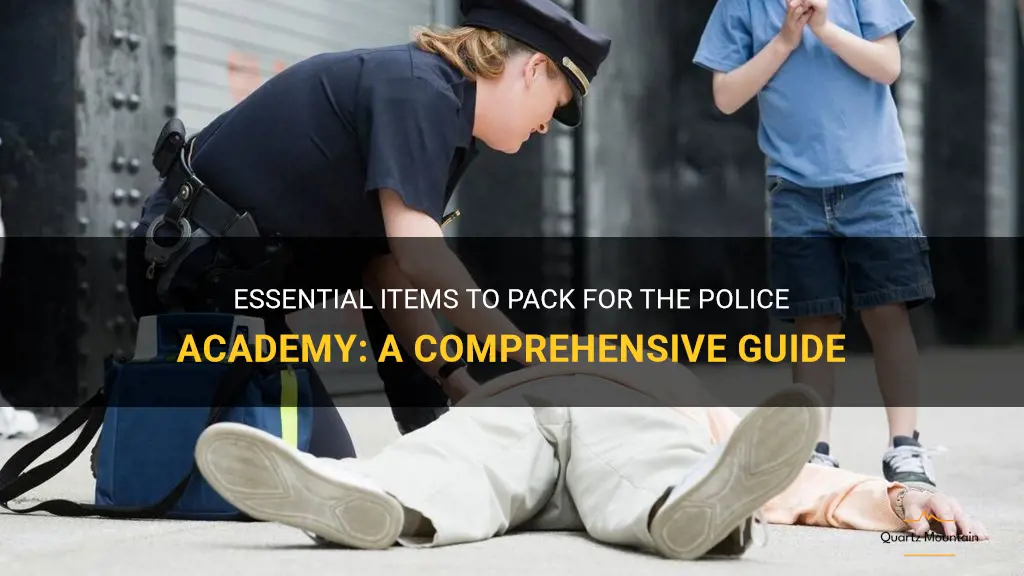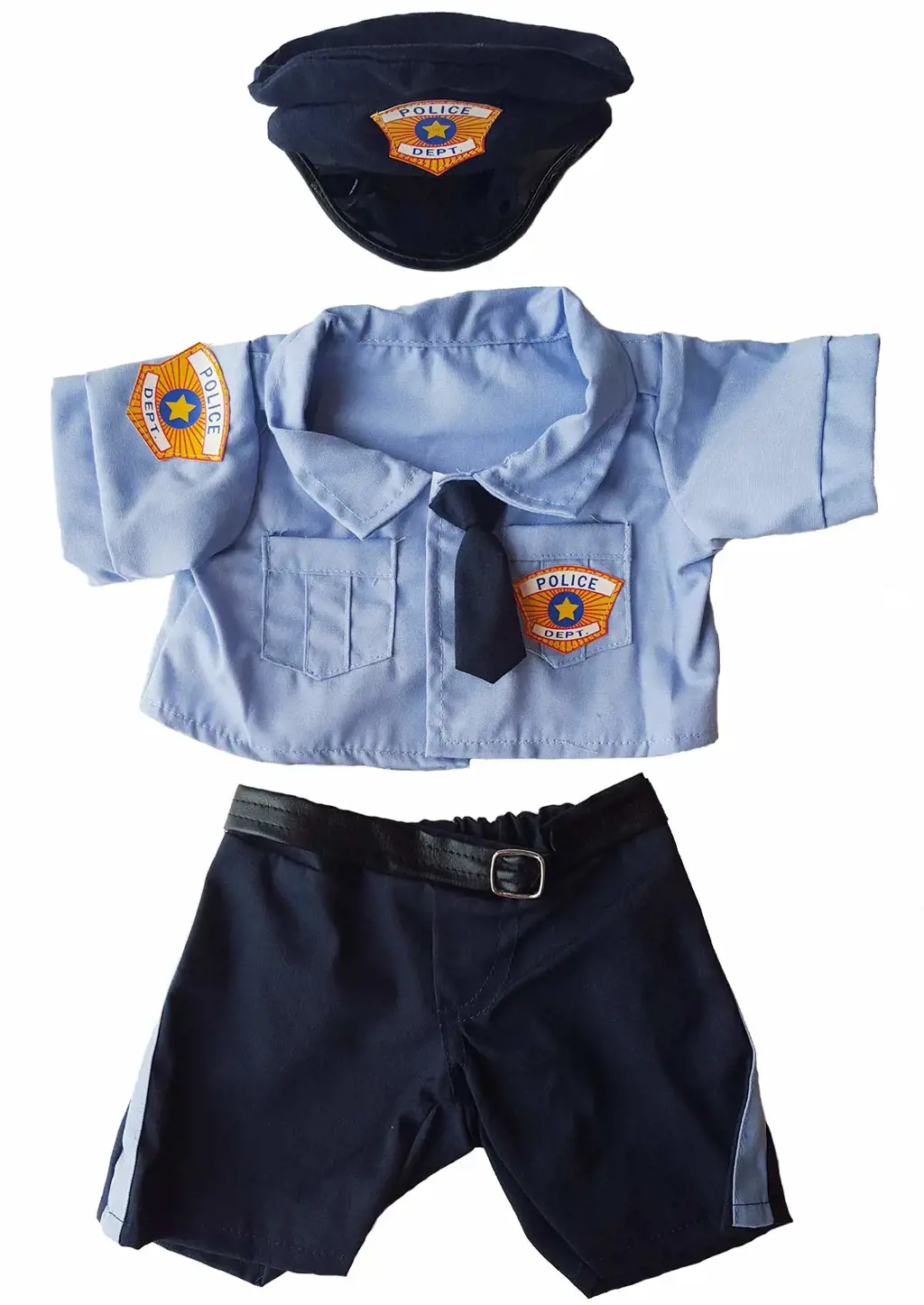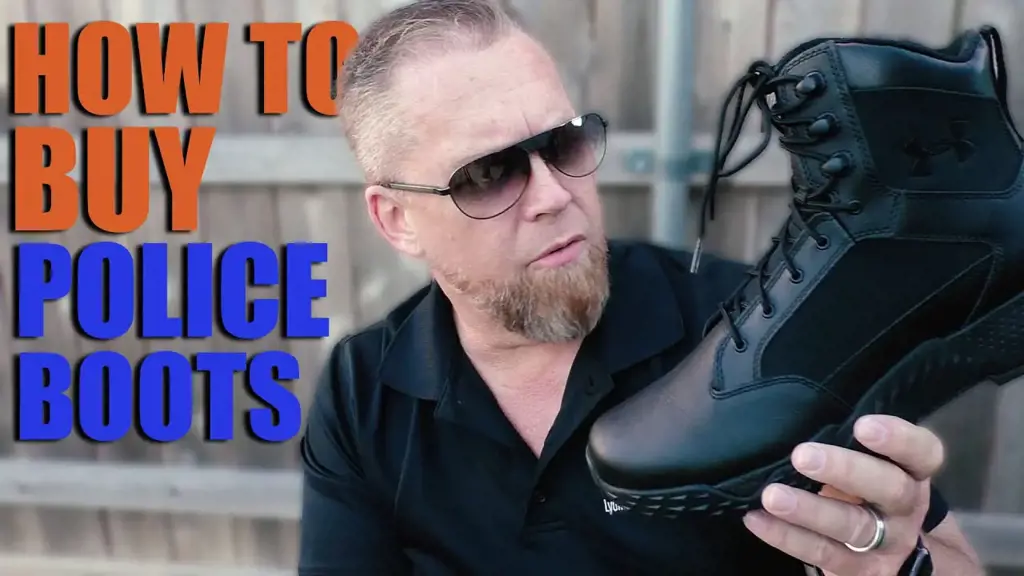
Going off to the police academy is an exciting and challenging time in anyone's life. As you prepare to embark on this new journey towards becoming a police officer, it's crucial to ensure that you have all the essential items packed and ready. In this comprehensive guide, we will walk you through everything you need to bring to the police academy, from uniforms and gear to personal hygiene items and study materials. So, grab a notepad, because you won't want to miss any of these must-have items that will set you up for success at the police academy.
What You'll Learn
- What basic clothing items should I pack for the police academy?
- Are there any specific regulations or guidelines on footwear for the police academy?
- What personal hygiene items should be included in my packing list for the police academy?
- Are there any specific items or equipment that I should bring for physical training or fitness activities at the police academy?
- Are there any recommended or required items for studying and taking notes during classroom sessions at the police academy?

What basic clothing items should I pack for the police academy?

When preparing for the police academy, it is essential to pack the right clothing to ensure comfort and functionality during your training. Here, we will outline the basic clothing items you should consider bringing with you to the police academy.
- Uniforms: Most police academies will provide you with at least one uniform set, but it is a good idea to pack additional ones. These typically consist of trousers, long sleeve shirts, and a jacket or vest. Make sure to check with your academy on the specific requirements for uniforms and any regulations regarding color and style.
- Workout attire: Physical fitness is a crucial aspect of police academy training. Pack several sets of workout clothes, including shorts, t-shirts, tank tops, and sneakers. Look for breathable and moisture-wicking fabrics to keep you cool and comfortable during intense physical activities.
- Undergarments: It is recommended to bring enough underwear and socks to last you through the week. Opt for moisture-wicking athletic socks to prevent blisters and keep your feet dry during long days of training. Don't forget to pack sports bras for female trainees.
- Boots: Invest in a pair of durable and comfortable boots specifically designed for law enforcement. Look for features such as slip-resistant soles, ankle support, and waterproofing. It is crucial to break in your boots before the academy to avoid painful blisters during training.
- Outerwear: Depending on the climate of your academy location, pack appropriate outerwear such as a waterproof jacket, sweatshirts, or fleece jackets. Layering your clothing will allow you to adjust to different temperature conditions throughout your training.
- Accessories: Bring a high-quality belt that can support the weight of your duty gear. Look for a belt that is durable and adjustable to ensure a proper fit. Additionally, consider packing a hat or beanie for protection against the sun or cold weather, as well as gloves for handling firearms during practical exercises.
- Hygiene and personal care items: Don't forget to pack toiletries such as toothbrush, toothpaste, soap, shampoo, deodorant, and any other personal care items you may need. While some academies provide these items, it is always good to have your own supply.
It is crucial to remember that each police academy may have specific regulations and requirements for clothing. It is recommended to check with your academy beforehand to ensure you are packing the right items. Additionally, make sure to properly label and keep track of your clothing to prevent any mix-ups or loss.
In conclusion, packing the right clothing items for the police academy is essential to ensure your comfort and readiness for training. By incorporating uniforms, workout attire, undergarments, boots, outerwear, accessories, and personal care items, you can be well-prepared for the physical and mental challenges of police academy training.
The Ultimate Guide on What to Pack for College School Supplies
You may want to see also

Are there any specific regulations or guidelines on footwear for the police academy?

When it comes to joining the police academy, there are a lot of requirements and guidelines that potential candidates must adhere to. One important aspect that often gets overlooked is the type of footwear that is deemed acceptable for training and duty.
Footwear plays a crucial role in ensuring the safety and performance of police officers. The right pair of shoes can provide comfort, support, and protection throughout long hours of standing, walking, and running. Therefore, it is essential for the police academy to have specific regulations and guidelines on footwear.
Firstly, the police academy typically requires recruits to wear black leather boots. These boots are chosen for their durability and ability to withstand the demands of police work. They are designed to provide ankle support and prevent injuries during high-intensity activities.
In addition to the color and material, the boots must also meet certain criteria in terms of features. They should have a slip-resistant sole to ensure stability on various surfaces, especially during pursuits or on slippery terrain. The sole should also be oil-resistant to provide traction and prevent accidents in environments where oil spills are common, such as gas stations.
The boots should have a reinforced steel toe cap to protect the feet from falling objects or accidental impact. This is particularly important in situations where officers may encounter physical confrontations or potential dangers that could harm their feet.
Furthermore, the boots should be waterproof or at least water-resistant to keep the feet dry in wet environments or during adverse weather conditions. Wet feet can lead to discomfort, blisters, and even fungal infections. Keeping the feet dry is crucial for the overall well-being and performance of the officers.
Apart from the specific regulations on the boots, the police academy may also provide guidelines on the proper fit and maintenance of footwear. A well-fitting boot is essential for comfort and preventing foot-related issues such as blisters or calluses. Recruits are often advised to try on different sizes and styles to find the perfect fit that provides ample room for the toes but also supports the arch and heel.
Proper maintenance of the boots is crucial for their longevity and performance. Recruits are instructed to clean and polish their boots regularly to maintain their appearance and prevent the leather from cracking or deteriorating. They should also inspect the boots for any signs of wear and tear and replace them if necessary, as worn-out footwear can compromise safety and comfort.
In conclusion, the police academy does have specific regulations and guidelines on footwear for recruits. The boots must be black leather with slip-resistant and oil-resistant soles, a reinforced steel toe cap, and be waterproof or water-resistant. Recruits are also instructed on proper fitting and maintenance to ensure the longevity and performance of their footwear. Adhering to these guidelines is crucial in providing officers with the best protection and comfort while on duty.
The Ultimate Packing List for a Memorable Trip to Drumheller
You may want to see also

What personal hygiene items should be included in my packing list for the police academy?
When packing for the police academy, it is essential to include personal hygiene items that will help you stay clean and fresh throughout the rigorous training program. Good hygiene is not only important for your own well-being but also for professional and social reasons. In this article, we will discuss some essential personal hygiene items that should be included in your packing list for the police academy.
- Soap and body wash: It is crucial to have a good quality soap or body wash to keep your body clean and free from odor. Look for a soap that is gentle on the skin and has a pleasant fragrance but is also effective in removing dirt and sweat.
- Shampoo and conditioner: Taking care of your hair is equally important as taking care of your body. Choose a shampoo and conditioner that suits your hair type and keeps it clean, healthy, and manageable.
- Deodorant: During the intense physical training at the police academy, you are bound to sweat. Including a reliable deodorant in your packing list will help mask any unpleasant odors and keep you feeling fresh throughout the day.
- Toothbrush and toothpaste: Maintaining good oral hygiene is essential not only for your personal well-being but also for maintaining professional appearances. Pack a toothbrush and toothpaste to ensure you can maintain proper dental care and have fresh breath.
- Razor and shaving cream: Keeping a well-groomed appearance is crucial in the law enforcement profession. Pack a razor and shaving cream to keep your facial hair neat and tidy.
- Moisturizer: The intense physical training at the police academy can take a toll on your skin. Include a good moisturizer in your packing list to keep your skin hydrated and prevent dryness or irritation.
- Nail clippers: Proper nail care is important in maintaining a professional appearance. Pack nail clippers to keep your nails clean and trimmed.
- Hairbrush or comb: Depending on your hair type, pack a hairbrush or comb to keep your hair looking neat and presentable.
- Sunscreen: Spending long hours outdoors during training exposes you to harmful UV rays. Protect your skin by including a sunscreen with a high SPF in your packing list.
- Feminine hygiene products: For female trainees, including feminine hygiene products such as tampons or sanitary pads is crucial for maintaining personal hygiene and comfort.
Remember, these are just a few of the essential personal hygiene items you should include in your packing list for the police academy. Adapt this list to suit your specific needs and preferences. Additionally, it is always a good idea to carry extra quantities of these items as they may not be easily accessible during your training. Maintaining good personal hygiene will not only promote your well-being but also reflect positively on your professionalism and image as a police officer.
Essential Items to Pack for a Memorable Three-Day Trip in Wales
You may want to see also

Are there any specific items or equipment that I should bring for physical training or fitness activities at the police academy?
When preparing for physical training or fitness activities at the police academy, it is important to have the right equipment and items to ensure that you can perform to the best of your abilities. Here are some specific items that you should bring:
- Athletic Shoes: A good pair of athletic shoes is essential for any kind of physical activity. Look for shoes that provide good support and cushioning to minimize the risk of injury. Make sure they fit well and are comfortable to wear for long periods of time.
- Workout Clothes: Choose workout clothes that are comfortable and allow for a full range of motion. Opt for moisture-wicking materials that can help keep you dry and cool during intense workouts. It is also a good idea to bring extra sets of workout clothes, so you can change into clean ones if needed.
- Water Bottle: Staying hydrated is crucial during physical training. Bring a water bottle that is easy to refill and carry around. Aim to drink water before, during, and after each workout to maintain optimal hydration levels.
- Gym Towel: A small towel can come in handy during workouts to wipe away sweat and keep yourself dry. Look for a towel that is absorbent and quick-drying.
- Resistance Bands: Resistance bands are versatile and can be used to add intensity to various workouts. They are lightweight and easy to pack, making them a great addition to your fitness equipment.
- Foam Roller: Foam rollers are excellent for self-myofascial release, which helps reduce muscle tightness and improve flexibility. Using a foam roller before and after workouts can help minimize soreness and speed up recovery.
- Stopwatch or Timer: During timed exercises or activities, having a stopwatch or timer can be useful for tracking your progress and pushing yourself to beat your previous times.
- Extra socks: It is always a good idea to bring extra pairs of socks. Sweaty or wet socks can be uncomfortable and increase the risk of blisters or infections.
- Personal Protective Equipment (PPE): Depending on the training, you may need to bring additional PPE such as gloves or a helmet. Follow the instructions provided by your academy to ensure you have the necessary gear for specific activities.
- Hand Sanitizer: In today's world, it is important to prioritize hygiene. Having a small bottle of hand sanitizer with you can help keep your hands clean before and after using shared equipment.
Remember, it is always a good idea to check with your police academy beforehand to see if there are any specific requirements or recommendations regarding fitness equipment or items. By being well-prepared, you can ensure a successful and safe training experience at the police academy.
Essential Items to Pack for a Trip to Berlin: A Comprehensive Guide
You may want to see also

Are there any recommended or required items for studying and taking notes during classroom sessions at the police academy?
When it comes to studying and taking notes in the police academy, it is important to come prepared with the right tools and resources. While some items may be recommended or required, there are also personal preferences that can enhance the learning experience. In this article, we will discuss some of the essentials for studying and taking notes during classroom sessions at the police academy.
- Notebooks or notepads: One of the most important items for studying and taking notes is a notebook or notepad. These can be used to jot down important information, make diagrams, or write down key concepts. It is recommended to use a notebook with plenty of pages to ensure you have enough space for all your notes.
- Pens and highlighters: Having a good set of pens and highlighters is essential for taking effective notes. Different color pens can be used to differentiate between main ideas and supporting details, while highlighters can be used to emphasize important information. It is a good idea to bring a variety of colors to make your notes visually appealing and easy to read.
- Sticky notes or bookmarks: Sticky notes or bookmarks can be used to mark important pages or sections in textbooks or reference materials. They can also be used to quickly jot down reminders or questions that you may want to ask during class or discussions. Having these handy can help you stay organized and easily find information when you need it.
- Digital devices: In today's digital age, many students prefer to take notes using electronic devices such as laptops, tablets, or smartphones. These devices can offer advantages such as the ability to easily search and organize notes, as well as the convenience of typing instead of handwriting. However, it is important to check if the police academy allows the use of electronic devices during classroom sessions, as some institutions may have specific guidelines or restrictions.
- Study aids and reference materials: Depending on the curriculum and courses being taught at the police academy, there may be specific study aids or reference materials that are recommended or required. These could include textbooks, study guides, online resources, or specialized software. It is important to be prepared and have the necessary materials available to enhance your learning and understanding of the subject matter.
In addition to these items, it is also important to create a conducive learning environment. This could include finding a quiet and comfortable place to study, eliminating distractions such as phones or television, and setting realistic goals and study schedules. Having a positive mindset and being motivated to learn can also greatly impact your studying and note-taking experience.
In conclusion, while there may be recommended or required items for studying and taking notes at the police academy, it is also important to consider personal preferences and individual learning styles. Equipping yourself with the right tools and resources, such as notebooks, pens, digital devices, and study aids, can help optimize your studying and note-taking experience. Remember to create a conducive learning environment and stay motivated to make the most out of your time at the police academy.
Essential Items to Pack for an Iceland Road Trip Adventure
You may want to see also
Frequently asked questions
When packing for the police academy, it's important to bring comfortable and durable clothes. This typically includes athletic-style clothing, such as moisture-wicking t-shirts, sweatpants or shorts, and athletic socks. Make sure to pack enough clothing for the duration of your academy training, as laundry facilities may not always be readily available.
It is generally recommended to bring your own boots to the police academy. Look for boots that meet the academy's requirements, such as being polishable, slip-resistant, and providing good ankle support. Breaking in your boots before the academy is also advised to prevent discomfort and blisters during training.
Most police academies provide recruits with the necessary duty belt and accessories, so you typically won't need to bring your own. However, it's always a good idea to check with the academy beforehand to confirm their policy on duty belts. If you do need to bring your own, make sure it meets the academy's specifications and is properly fitted.
Personal hygiene items are essential when packing for the police academy. Make sure to bring items like toothbrush, toothpaste, shampoo, conditioner, soap, deodorant, razor, and any other personal care products you typically use. It's also a good idea to pack a shower caddy or toiletry bag to keep your items organized and easily accessible.
Yes, there are certain items that are typically prohibited at the police academy. These can include firearms, ammunition, knives, and other weapons. It's important to carefully review the academy's guidelines and policies regarding prohibited items and ensure that you do not pack or bring any of these items with you.







